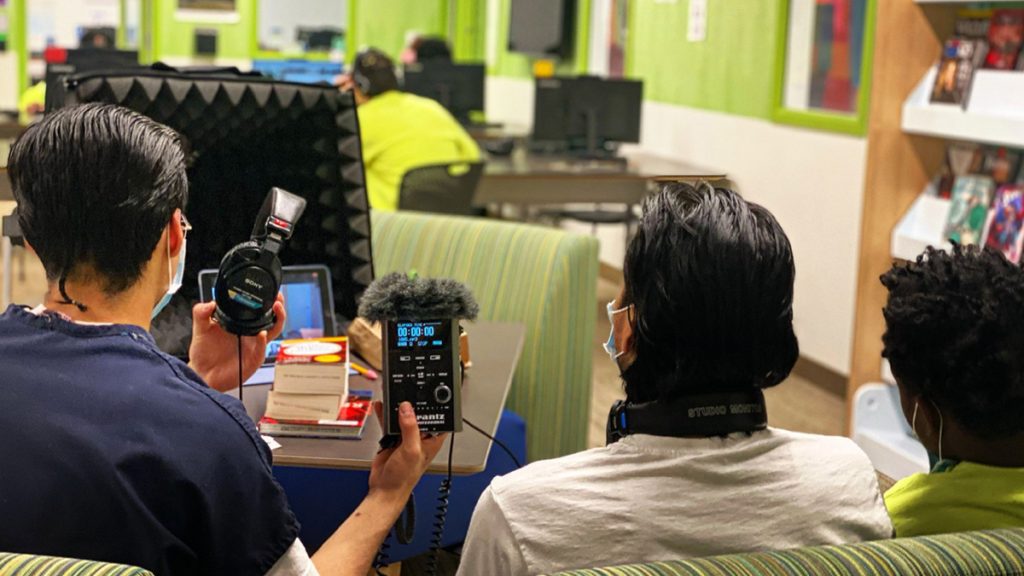
Three teens get ready to record an interview in the library at the Judge Patricia H. Clark Children and Family Justice Center in Seattle, Washington during a RadioActive Youth Media podcasting workshop on April 15, 2021. Photo: Megan Sobchuk
Facilitating media-making workshops with youth who are incarcerated
11 tips for getting started
Youth media programs are an opportunity for your newsroom to meaningfully engage with the people most impacted by the stories you cover.
Hosting story-making workshops — with no pressure to publish anything unless the youth involved want to — can allow your newsroom to build relationships with members of your community you might not otherwise reach.
And one way to do that is by hosting youth media workshops with youth who are incarcerated in your area.
Facilitating media-making workshops inside a youth detention center takes time, people, training, research, trust, and money — but it’s part of public media’s mission to create and serve a more informed public. And we’ve found it’s worth it.
RadioActive Youth Media, the teen journalism program at KUOW Public Radio in Seattle, Washington, has been leading podcasting workshops at two youth detention centers since 2015. A 2021 podcast created in one of those workshops, “They can never lock your mind up: three stories from juvenile jail,” received national recognition from the Public Media Journalists Association and Evident Change’s Media for a Just Society Awards.
From our experiences working with RadioActive in youth detention centers, we’ve compiled a list of tips for anyone preparing to facilitate a media-making workshop with youth who are incarcerated.
These tips are intended for people who have experience facilitating youth media programs, but are new to facilitating in youth detention centers. This tip sheet is a living document, and feedback is welcome on this Google Doc, or by emailing Kelsey at kkupferer@kuow.org. These tips were informed by educators, journalists and activists in Chicago, Illinois and Seattle, Washington, including folks at Liberation Library.
1. Learn everything you can about the facility you’ll be working in.
When preparing to facilitate a media-making workshop with youth who are incarcerated, get as much information as you can about the detention center from as many different sources as possible, including detention center staff, other volunteers and educators, news articles, current and former youth at the facility, parents, activists, and organizers. Here are some questions to consider asking:
- Who are the youth detained at this facility? (Ages? Genders? Where are they from?)
- What type of facility is this? What is this facility’s mission?
- Why are youth incarcerated here? Are the youth here awaiting trial, or have they already been sentenced, or are they simply awaiting a safe place to go? (While you don’t need to know any information about youth’s individual cases, we’ve found that it’s helpful for facilitators to know, generally, why youth are in this facility.)
- What is the average length of stay in this facility? What is it supposed to be?
- What is an average day at this facility like for the youth here?
- What is the culture like among youth here? Among staff?
- What is the history of this facility? When was it built, and why?
- How has this facility changed over the past few years?
- What problems is the detention center experiencing right now?
- Are any changes expected in this facility’s future?
- How has the surrounding community responded to this facility?
- What are this facility’s policies and best practices for volunteers?
- Will we be able to publish the work (writing, photos, audio, etc.) the youth create in this media-making workshop? What are the requirements for publication?
- What else should we know about working in this specific youth detention facility?
While you’re learning about the specific facility you’ll be working in, you also need to learn as much as you can about the history and daily realities of incarceration in this country, especially if you don’t have lived experience with incarceration yourself. The most valuable information comes from people who have lived experience with incarceration. Some resources to get you started are linked at the end of this article.
2. Utilize the same facilitation best practices you use in any youth program.
When working with youth who are incarcerated, it’s especially important to use the same facilitation best practices you use in all other youth programs. RadioActive Youth Media uses a tool called the Youth Program Quality Assessment (YPQA) to help build and maintain supportive youth environments. You can download the YPQA assessment tool for free. Some of these facilitation best practices include:
- Set and stick to community agreements.
- Set clear goals. Be explicit with what the space is and isn’t for when we’re together.
- Meet youth’s basic needs. Bring meals, snacks and drinks (within the facility’s rules). Schedule time for bathroom breaks and breaks for rest or prayer. Allow youth to opt-out of the workshop, and set up a place where youth can go to read or draw or nap on their own if they don’t want to participate.
- Prioritize youth safety, wellbeing and positive experience over making “great content” or teaching certain skills. What we teach and produce should never be more important than having fun and building connections with youth.
- Give youth meaningful choices. You might ask youth to choose from a selection of different pieces of media to engage with, or to choose between two different activities, or to choose if they want to work individually or in small groups, or to choose what type of media they want to make, or to choose their story topics, or to choose what snacks they want you to bring in. Prioritize youth decision-making and agency.
- Encourage youth to ask questions. Affirm youth when they do ask questions. Build in time for Q&A sessions and checking for comprehension. Make it clear that it’s OK to interrupt you with questions.
- Give youth enough time to process questions. Instead of asking a big group a question and waiting through silence, have them journal or “pair and share” their answers first to give them time to gather their thoughts.
- Provide different ways for youth to engage and share. You might ask youth to participate in any given activity by writing in a journal, talking to a partner, or putting a sticker on the board next to the response they most agree with. If a youth isn’t interested in participating the same way everyone else is, find other roles for them, such as illustrating or fact-checking a peer’s story. Allow youth to opt-out of participating.
- Be flexible with where the group wants to go. Coming in with “items we need to get through” can be overwhelming for vulnerable youth in a space that’s highly surveilled. Give youth as much freedom as possible. Never force a young person to participate.
- Model humility and realness. Come into the facilitation space relaxed, grounded, excited, humble, and positive. Take a few minutes to ground yourself before entering the space.
3. Build trust with youth by getting to know them and sharing things about yourself (within the facility’s rules).
Playing get-to-know-you games like “Two Truths and a Lie” with youth and facilitators can be a fun way to start off a program. Young people tend to enjoy when visiting adults share things about themselves as a way of breaking the ice.
However, detention facilities often have strict rules against facilitators sharing their full name, school or work affiliation, address, social media handles, or any contact information (phone number, email address) or other identifying information about themselves. At many detention centers, youth are not allowed to contact a visiting facilitator after the workshop. Youth may be allowed to contact your organization, though, and you can let them know that.
4. Be an open and curious listener, and refrain from making assumptions.
Like in all youth programs, show youth that you are listening to them and that you’re curious about their actual thoughts. Ask them open-ended questions. Ask them to clarify and elaborate. Challenge them to go deeper or defend an idea. Encourage them to ask you questions.
Never talk down to youth, or make assumptions about their thoughts, their experiences, their future, or their interests. For example, some youth might already be parents or be pregnant. They may or may not be married or have long-term romantic partners. They may be queer or not, religious or not, and hold any number of different identities. They may be incarcerated for any number of reasons, including serious offenses like murder. They may have been incarcerated for two days, or two years. They may or may not have loved ones who are or were incarcerated, and have opinions about that. They may or may not agree that some people ought to be incarcerated (i.e., don’t assume youth who are incarcerated are prison abolitionists).
5. Prioritize youth wellbeing over producing content.
Producing a story in a youth media program can be a liberating experience for a young person. But youth media programs can also unintentionally exploit vulnerable youth if they’re not facilitated with care, intention, and expertise.
When leading a media-making workshop inside a youth detention center, your goal should never be to find sources or story ideas for your own journalism projects, or to create great content for your station or organization to publish. Instead, your focus must always be on creating the space and providing the tools necessary for young people to build positive relationships, try something new in a supportive environment, and express themselves freely and joyfully.
6. Remind youth that the programming space is not confidential, and youth should not talk about their cases.
At the beginning of the session, tell youth that their interactions in the programming space are not confidential. First, let youth know if your staff members are required to report if youth share thoughts of harming themselves or others, or disclose child abuse or neglect. Second, emphasize to youth that they should not talk about their cases to anyone except their lawyers.
Any information they share in this programming space, even inadvertently, can be used against them. The space we’re in is not private, and you never know how information they share will be relayed or used. Do not ask questions that could incriminate them. Also, interrupt if you sense they may be sharing anything about why they’re there. You might say, “I am happy you’re willing to share this with me. However, this space isn’t private. We should not discuss your case here.”
7. Keep your focus on youth, but utilize trusting relationships with staff if present.
Youth will have varying relationships with officers, guards, librarians, other volunteers, and other detention center staff members. Depending on the facility, youth may have positive relationships with some of the adult staff members that can help encourage program participation.
If detention center staff members are derailing the program or focusing on themselves, it’s OK to return the focus to youth and the program goals (perhaps by emphasizing that we have limited time to run the program). But if detention center staff have strong relationships with youth, it’s also OK to lean into those relationships to encourage participation.
For example, the detention center librarian may feel more comfortable calling on a student to answer a question because they know them well and know they have something to say. We’ve also observed adults asking questions of youth who they know want to participate but who might be a little shy/unsure about visiting facilitators — e.g. the staff can help you break the ice. You can often observe how young people are interacting with the adults in the room to pick up some context/clues about their relationships.
8. Be flexible and expect changes.
Things are always changing at a detention center. You might arrive on day two of a two-day workshop to find that you’re working with a completely new group of youth than you were with the day before. The detention center might cancel your workshop at the last minute, or shorten its length without warning, or add new youth into the group, or move your group to a new location. Staff might tell you to plan to work with boys, and then bring you a group of girls. Staff might have prepared youth for what to expect in your workshop, or not. Do your best to expect these changes, plan for them, and roll with them when they happen.
9. Youth may have questions about what’s going on on the outside.
Know that questions about what’s going on in the community might come up, so decide as a staff how you’ll handle them. We observed recently that youth will ask questions about things they see in your room if you’re “Zooming” in for a virtual workshop. Youth got animated toward the end of a workshop because a facilitator had a “Black Trans Lives Matter” poster in the background. It led to an impromptu Q&A about gender and sexuality! So being flexible with where the group wants to go sometimes is great. (We once got poetry and songs recited to us because that’s what the group was feeling— they were working on a play and wanted us to come back and see it so they gave us a preview, and it was incredible.)
10. You might grapple with working within a system that is harmful.
It might feel like you’re propping up a harmful system by offering a workshop in a detention center. Our observation is that stuff that breaks monotony for youth is welcome. So your non-condescending presence — even if youth might not seem animated at first — is probably welcome. We regularly get asked when we’re coming back at the end of our sessions. You need to decide if working within this system is OK for you, but youth feedback suggests they generally enjoy the experience, and enjoy sharing the stories they make with the people in their lives. That said, there’s no program we can run that erases the fact that we’re working within a dehumanizing system.
11. You must take care of yourself.
Spending time in spaces where people are incarcerated is hard, especially if you or your loved ones have experience with incarceration. This workshop may be difficult for you in ways you can’t yet know. Create time for yourself before and after the workshop to mentally and physically prepare to be in the space, and to care for yourself afterwards. You might want to make a cup of tea and journal, spend time with friends, meditate — whatever you do to care for yourself. Try, if possible, to not schedule anything else on the days you’re working at the detention center, because you may feel more drained than you expected after the workshop, especially if working at a detention center is new for you. If at all possible, make the detention center workshop the only thing that you’re doing on workshop days, and possibly give yourself a free day afterwards to rest and reflect.
More resources we love for preparing to lead media-making workshops with youth who are incarcerated
- Scalawag’s 2021 The Press in Prison guidebook is a practical, abolitionist guidebook for doing reporting inside prisons.
- The Prison Journalism Project’s 2021 Prison Journalism Project Toolkit by Yukari Kane is a guide for journalists and writers on the outside who are collaborating with journalists and writers who are incarcerated.
- The 2022 Travel guide for prison educators by Nick Hacheney and Tomas Keen from the Open Campus newsletter “College Inside” is a short list of things for educators to remember when working with youth who are incarcerated.
- The Marshall Project’s 2021 What Words We Use — and Avoid — When Covering People and Incarceration is a great primer on language.
- If you want to go in-depth in learning about prison abolition, lawyer and community organizer Nikkita Oliver created a community abolition syllabus in 2021 which is free to access and is a treasure chest of information. It includes podcasts, articles, videos, and book excerpts about prison abolition.
- Radiotopia’s Ear Hustle is our favorite podcast about everyday prison life, produced by adults who are incarcerated. (The Ear Hustle producers have a great book out now too.) WNYC’s Caught is a podcast about the juvenile legal system, and while it is not youth-produced, youth are part of every episode. Uncuffed and The Secret Life of Prisons are two more podcasts produced by people who are incarcerated.
- This 2018 audio story from This American Life, Throw the book at them (21 mins), is about teens going to school in detention. It is an intimate portrait of what learning is like for some youth who are incarcerated.
- ‘They can never lock your mind up.’ Three stories from juvenile jail is a short podcast produced by youth incarcerated in King County, Washington in 2021 with support from KUOW Public Radio and RadioActive Youth Media.
Want to start a youth media program at your station, but don’t know where to start? Sign up here to get more tips from Mary Heisey and Kelsey Kupferer on building or strengthening your youth media program.

